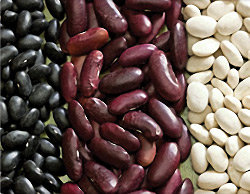- Fruits & Vegetables
- GMOs & Organics?
- Benefits of Grains
- What's a Carb?
- Low Carb Substitutes
- Proteins: Building Blocks
- Protein-Packed Breakfasts
- Meats: Keep it Lean
- Dairy Health Benefits
- Importance of Vitamin D
- Artificial Sweeteners
- Eating a Healthy Diet
- Fiber Sources & Benefits
- How Much Water?
- Example 2 Day Meal Plan
- Mediterranean Diet Pyramid
- Nutrition Facts Label
- Vitamins & Minerals
- U.S. Dietary Guidelines
fiber sources and benefits
 |
Fiber comes from the structural portion of plants—or what we might think of as the stalk. There are two major types of fiber, insoluble and soluble. Insoluble fiber helps keep the digestive tract healthy. Soluble fiber helps lower blood cholesterol and helps you to feel fuller longer. |
||||||||||||||||||||||||||||||||||||||||||||||||||||||||||||||||||||||||||||||||||||||||||||||||||||||||||||||||||||||||||||||||||||||||||||||||||||||||||||
|
While there's debate about the relation of dietary fiber to colon cancer, low fiber intake is strongly linked with cardiovascular disease, hemorrhoids and Type II Diabetes. There's some controversy surrounding the use of artificial sweeteners as a food additive. You may have heard concerns that they contribute to birth defects and cancer, or could be linked to behavioral problems. There's no research that indicates that this is true. The U.S. Food and Drug Administration regulates the use of artificial sweeteners and to date has not been presented with scientific information that would suggest that they're unsafe. Some people report that artificial sweeteners cause them problems (e.g., headaches, stomach upset) and are not able to use them in place of sugar in foods.
Fiber Intake Recommendations
Fiber is sometimes added to foods, and it's unclear if added fiber provides the same health benefits as naturally occurring sources. Therefore, to meet the recommendation for fiber, Americans should increase their consumption of beans and peas, vegetables, fruits, whole grains and other foods with naturally occurring fiber. Dietary fiber is listed under carbohydrates on the Nutrition Facts label of a product.
Fiber Content of Common Foods
Did you know? That beans are practically a perfect food? |
|||||||||||||||||||||||||||||||||||||||||||||||||||||||||||||||||||||||||||||||||||||||||||||||||||||||||||||||||||||||||||||||||||||||||||||||||||||||||||||
H‑E‑B Health Care Services Notice of Privacy Practice | Texas State Board of Pharmacy | How to Dispose of Unused Medicines